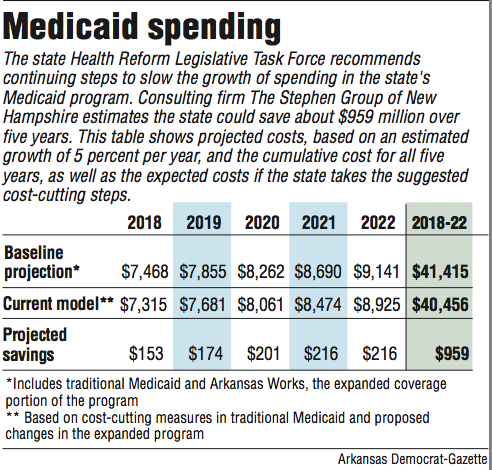During its final meeting Thursday, which lasted just over 20 minutes, a legislative task force unanimously approved a report recommending steps the state should take to slow the growth of spending in the state's Medicaid program.
The report by the Health Reform Legislative Task Force endorses changes that the Department of Human Services has planned or are in the works, which a consulting firm projected will save $959 million from July 1, 2017, through June 30, 2022.
The report also recommends that the state take additional steps to coordinate the Medicaid benefits provided to the developmentally disabled and mentally ill, but doesn't offer an opinion on whether those benefits should be provided through managed care.
The Legislature created the task force last year to study and recommend changes to the state's Medicaid program, with a final report due by the end of this month.
The task force report notes that "the Medicaid program is on an unsustainable path, using [a] conservative growth estimate of 5 percent for [the] next five years."
Late last year, the task force endorsed Gov. Asa Hutchinson's plan to seek federal approval for changes to the state's expanded Medicaid program, as well as his goal to slow the growth of spending in the traditional Medicaid program by enough to save $835 million over five years.
The savings are meant in part to help offset the cost of the Medicaid expansion, now known as the private option but to be renamed Jan. 1 as Arkansas Works. The savings will be calculated by comparing actual Medicaid expenses to projections that assume a 5 percent annual growth rate in costs.
A 5 percent growth rate would increase total Medicaid spending from $7.5 billion in the state's fiscal 2018, which starts July 1, to more than $9.1 billion in fiscal 2022, The Stephen Group of Manchester, N.H., estimated.
The 2022 cost would be reduced to $8.9 billion based on the expected savings from the changes being implemented or planned.
Over the five-year period, the state's consultant projected that spending would total about $40.5 billion if the changes are incorporated, compared with a $41.4 billion total that would result from an annual growth rate of 5 percent.
A draft report that the task force reviewed Wednesday had listed the projected savings over five years at $963 million.
John Stephen, managing partner with The Stephen Group, said that number was reduced in part to reflect state officials' abandonment of a proposal to reduce the hourly reimbursement paid to providers for group psychotherapy.
A proposal being explored by Hutchinson to hire provider-led managed care organizations to provide Medicaid benefits for the developmentally disabled and mentally ill would save an additional $195 million over the five-year period, the consultant estimated.
Hiring traditional managed care companies to provide those benefits would increase the additional savings to $321 million, according to the report.
The expansion of the state's Medicaid program in 2014 extended coverage to adults with incomes of up to 138 percent of the federal poverty level: $16,394 for an individual, for instance, or $33,534 for a family of four.
The federal government has paid the full cost of coverage for the newly eligible adults, but Arkansas will begin paying 5 percent of the cost on Jan. 1. The state's share will then rise every year until it reaches 10 percent in 2020.
More than 324,000 Arkansans were enrolled in the expanded part of the program as of Sept. 30. During the fiscal year that ended June 30, about 750,000 Arkansans were served by the traditional Medicaid program covering primarily poor people who are elderly or disabled, and children in low-income families.
Sen. Jim Hendren, R-Sulphur Springs, and a chairman of the task force, said the state's strategy to ensure that it can afford that cost will ultimately be up to Hutchinson and the full Legislature.
"At the end of the day, doing nothing is just not an option," Hendren said.
Metro on 12/16/2016
